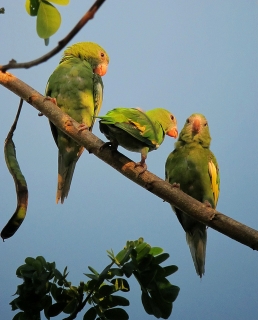White-winged Parakeet |
|
|
Also known as: Canary-winged Parakeet
Photos
View in GalleryDid You Know?
The White-winged Parakeet is the most successful introduced parrot in Puerto Rico.Academic Research
Related publications: Brotogeris versicolurusSpecies Profile
Genus: Brotogeris | Species: versicolurus
Size:
22cm (8.6 in)
Weight:
70g (2.4 oz)
Subspecies including nominate:
one
Colour Adult:
Both adults small, long-tailed mainly green parrots with yellow and white in wings; lores bare with a few grey/blue feathers; primary coverts and primary feathers white, outerwebs of primaries blue/green; secondary coverts yellow, secondary feathers white/yellow. Bill horn coloured tinged with yellow/brown. Bare eye ring pale grey, eye dark brown.
Colour Juvenile:
As in adult but with fewer white primaries and these tipped green; secondary coverts yellow and green; shorter tail. Upper mandible brown at base.
Call:
Shrill metallic calls in flight.
Listen NowVideo Links:
Video 1More Information:
Avibase
The California Parrot Project
Content Sources:
CITES
BirdLife International
Cornell Lab of Ornithology/Birds of the World
Parrots: A Guide to Parrots of the World, Juniper and Parr, 1998
ML Media Catalogue No. 45915 White-winged Parakeet (Brotogeris versicolorus), Parker, Theodore A., III, Loreto, Peru, June 30 1987, Cornell Lab of Ornithology. Site
Parrots of the World, Forshaw and Cooper, 1977. 2010 edition
Parrots of the World, Forshaw, 2006.
Parrots in Aviculture, Low, 1992.
Photos
View in GalleryDid You Know?
The White-winged Parakeet is the most successful introduced parrot in Puerto Rico.Academic Research
Related publications: Brotogeris versicolurusSpecies Care
Captive Status:
Less common than formerly.
Longevity:
Around 10 yrs.
Housing:
Aviary or suspended enclosure, minimum length 2m (6.5 ft).
Diet:
Fruit such as: apple, pear, orange, cactus fruits, pomegranate, forming about 30 percent of diet; fresh vegetables if taken, especially carrot, celery, green beans and peas, corn on the cob, green leaves; spray millet, small seed mixture, soaked and sprouted sunflower seed, cooked/ sprouted beans and pulses, and complete pellet.
Enrichment:
Bathing, foot toys, mimicking sounds, items for climbing (ladders, ropes) and chewing (bird-safe woods, vegetable tanned leather items), swings, bells.
Nest Box Size:
10" x 10" x 16" (25.4cm x 25.4cm x 40.6cm) vertical box.
Clutch Size:
3 to 6
Incubation Time:
26 days
Fledging Age:
7 weeks
Hatch Weight:
About 3g (0.1 oz)
Peak Weight:
Not recorded.
Weaning Weight:
Not recorded.
Photos
View in GalleryDid You Know?
The White-winged Parakeet is the most successful introduced parrot in Puerto Rico.Academic Research
Related publications: Brotogeris versicolurusSpecies Wild Status
World Population:
Unknown, stable.
IUCN Red List Status:
Least Concern
CITES Listing:
Appendix II
Threat Summary:
In Peru, White-winged Parakeets comprise up to 35% of seizures in the markets surveyed. Habitat alteration has allowed the species to establish in Florida and California, US.
Range:
Occurs in SE Colombia and NE Peru east to French Guiana and NE Brazil; may be seen in E Ecuador and deep south of Surinam. Introduced in Lima district, Peru, Puerto Rico and Miami, Florida, and possibly Dominican Republic, West Indies.
Habitat:
Occurs in a wide variety of areas, including moist, seasonal and riparian forests, pantanal, savanna and parkland. Mostly in lowlands but reported to 2700m (8856 ft) (conspecific behni).
Wild Diet:
Eats a wide variety of flowers, seeds and fruits, particularly feral flocks in Florida and California where many non-native plants and trees exist.
Ecology and Behaviour:
Gregarious, forming large flocks and communal roosts outside breeding season.
Clutch and Egg Size:
3 to 6 rounded eggs, 23.0 x 19.0mm (0.9 x 0.7 in).
Breeding Season:
Breeds in January in the US; anecdotal observations of July in South America. Nests are burrows into dry palm fronds, pre-existing tree cavities and arboreal termite mounds.
Photos
View in GalleryDid You Know?
The White-winged Parakeet is the most successful introduced parrot in Puerto Rico.Academic Research
Related publications: Brotogeris versicolurusMembers Only Resources
Please log-in now to find more research, resources and tools.
Not a Member?
Find more great information:
Gain exclusive access to 600+ pages of additional research, seminars and podcasts, specialists to ask your toughest questions, and dozens of other fun resources - when you become a WPT member.
Join Today >>

































